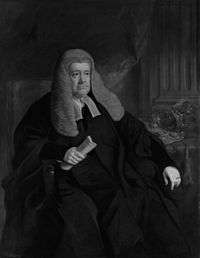Thomas Wilde, 1st Baron Truro
| The Right Honourable The Lord Truro PC QS | |
|---|---|
 | |
| Lord Chancellor | |
|
In office 15 July 1850 – 21 February 1852 | |
| Monarch | Victoria |
| Prime Minister | Lord John Russell |
| Preceded by | The Lord Cottenham |
| Succeeded by | The Lord St Leonards |
| Personal details | |
| Born |
7 July 1782 Castle Street, London |
| Died |
11 November 1858 (aged 76) Eaton Square, London |
| Nationality | British |
| Political party | Whig |
| Spouse(s) |
(1) Mary Wileman (d. 1840) (2) Augusta D'Este (1801-1866) |
| Alma mater | None |
Thomas Wilde, 1st Baron Truro PC QS (7 July 1782 – 11 November 1855), was a British lawyer, judge and politician. He was Lord Chancellor of Great Britain between 1850 and 1852.
Background and education
Born in London, Truro was the second son of Thomas Wilde, an attorney and founder of Wilde Sapte, by his wife Mary Anne (née Knight). He was educated at St Paul's School and was admitted an attorney in 1805. He was the younger brother of Sir John Wylde. James Wilde, 1st Baron Penzance, was his nephew.
Legal and political career
Wilde subsequently entered the Inner Temple and was called to the bar in 1817, having practised for two years before as a special pleader. Retained for the defence of Queen Caroline in 1820 he distinguished himself by his cross-examination and laid the foundation of an extensive common law practice. In 1824 he was made Serjeant-at-Law, and in 1827 King's Serjeant.
He first entered parliament in the Whig interest as member for Newark (1831–1832 and 1835–1841), afterwards representing Worcester (1841–1846). He was appointed Solicitor General in 1839, being knighted in 1840,[1] and became Attorney General in succession to Sir John Campbell in 1841. In 1846 he was appointed Chief Justice of the Court of Common Pleas, an office he held until 1850, when he became Lord Chancellor, and was created Baron Truro, of Bowes in the County of Middlesex.[2] He held this latter office until the fall of the Russell ministry in 1852.[3]
Family
Lord Truro married firstly Mary, widow of William Devaynes 1730–1809 and daughter of William Wileman, in 1813. They had three surviving children. After Mary's death in 1840 he married secondly Mademoiselle D'Este, Augusta Emma D'Este, daughter of Prince Augustus Frederick, Duke of Sussex and a first cousin of Queen Victoria, on 13 August 1845. There were no children from this marriage. Lord Truro died in London in November 1858, aged 76, and was succeeded in the barony by his second but eldest surviving son, Charles. Lady Truro died in May 1866, aged 64.
Thomas Wilde is commemorated by a Blue plaque erected on the front of 2 Kelvin Avenue Bowes Park London N13 which reads: "Site of Bowes Manor THOMAS WILDE 1st BARON TRURO 1782 – 1855 LORD CHANCELLOR 1850 – 1852 LIVED HERE"
Notes
- ↑ The London Gazette: no. 19828. p. 361. 21 February 1840.
- ↑ The London Gazette: no. 21117. p. 1995. 16 July 1850.
- ↑ Chisholm 1911.
References
 This article incorporates text from a publication now in the public domain: Chisholm, Hugh, ed. (1911). "Truro, Thomas Wilde, 1st Baron". Encyclopædia Britannica. 27 (11th ed.). Cambridge University Press.
This article incorporates text from a publication now in the public domain: Chisholm, Hugh, ed. (1911). "Truro, Thomas Wilde, 1st Baron". Encyclopædia Britannica. 27 (11th ed.). Cambridge University Press. Lee, Sidney, ed. (1900). "Wilde, Thomas". Dictionary of National Biography. 61. London: Smith, Elder & Co.
Lee, Sidney, ed. (1900). "Wilde, Thomas". Dictionary of National Biography. 61. London: Smith, Elder & Co. - Rigg, J. M.; Watkin, T. G. "Wilde, Thomas, first Baron Truro (1782–1855)". Oxford Dictionary of National Biography (online ed.). Oxford University Press. doi:10.1093/ref:odnb/29401. (Subscription or UK public library membership required.)
External links
- Hansard 1803–2005: contributions in Parliament by Thomas Wilde
| Parliament of the United Kingdom | ||
|---|---|---|
| Preceded by Michael Thomas Sadler William Handley |
Member of Parliament for Newark 1831 – 1832 With: William Handley |
Succeeded by William Ewart Gladstone William Handley |
| Preceded by Thomas Davies Joseph Bailey |
Member of Parliament for Worcester 1841 – 1847 With: Joseph Bailey |
Succeeded by Sir Denis Le Marchant, Bt Joseph Bailey |
| Legal offices | ||
| Preceded by Sir Robert Monsey Rolfe |
Solicitor General 1839–1841 |
Succeeded by Sir William Webb Follett |
| Preceded by Sir John Campbell |
Attorney General 1841 |
Succeeded by Sir Frederick Pollock |
| Preceded by Sir Frederic Thesiger |
Attorney General 1846 |
Succeeded by Sir John Jervis |
| Preceded by Sir Nicholas Conyngham Tindal |
Chief Justice of the Common Pleas 1846–1850 |
Succeeded by Sir John Jervis |
| Political offices | ||
| Preceded by The Lord Cottenham |
Lord Chancellor 1850–1852 |
Succeeded by The Lord St Leonards |
| Peerage of the United Kingdom | ||
| Preceded by New Creation |
Baron Truro 1850–1855 |
Succeeded by Charles Wilde |
.svg.png)